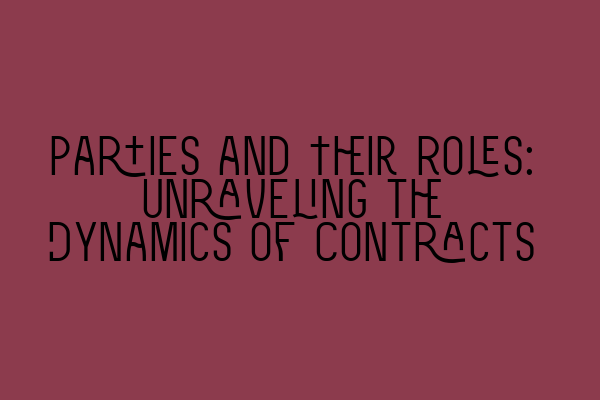**Parties and Their Roles: Unraveling the Dynamics of Contracts**
When it comes to the world of contracts, understanding the roles and responsibilities of each party involved is crucial. Whether you’re a business owner, a legal professional, or an individual entering into a contract, having a clear understanding of the dynamics at play can protect your interests and ensure a successful outcome. In this blog post, we will delve into the different parties involved in a contract, their roles, and the importance of each in the contract law landscape.
Before we dive in, if you’re preparing for the SQE 1 exam or looking for practice quizzes and mock exams, check out these related articles: [SQE 1 Practice Exam Questions](https://fqps.co.uk/sqe/sqe1-preparation/mcq-practice-quiz) and [SQE 1 Practice Mocks FLK1 FLK2](https://fqps.co.uk/sqe/sqe1-preparation/practice-mocks-quiz). For comprehensive SQE 1 and SQE 2 preparation courses, click [here](https://fqps.co.uk/sqe/sqe2-preparation) and [here](https://fqps.co.uk/sqe/sqe1-preparation). You can also find information about SRA SQE exam dates [here](https://fqps.co.uk/sqe/sqe1-sqe2-exam-dates).
Now, let’s get back to the topic at hand – parties and their roles in contracts.
**1. The Offeror**
The offeror, often referred to as the promisor, is the party who initiates the contract by making an offer to another party. They outline the terms and conditions of the contract and propose a specific action, payment, or performance. The offer must be communicated clearly and with the intent to create a legally binding agreement.
**2. The Offeree**
The offeree, or promisee, is the party to whom the offer is made. They have the power to accept or reject the offer. In the case of a bilateral contract, where both parties exchange promises, the offeree can accept by communicating their intention to be bound by the terms. In a unilateral contract, where one party makes an offer in exchange for a specific action, the offeree accepts by performing the requested action.
**3. Consideration**
Consideration is an essential element of most contracts. It refers to something of value that each party gives or promises to exchange as part of the agreement. Consideration can be in the form of money, goods, services, or even a promise to refrain from doing something. Without consideration, a contract may not be legally binding.
**4. The Legal Capacity**
For a contract to be enforceable, each party must have legal capacity, meaning they must be of sound mind and have the legal ability to enter into a contract. Minors, individuals with mental impairments, or those under the influence of drugs or alcohol may lack legal capacity. Contracts entered into by parties without legal capacity may be voidable.
**5. Genuine Consent**
For a contract to be valid, the consent of each party must be genuine and not obtained through fraud, duress, undue influence, or mistake. If a party is coerced or deceived into entering a contract, they may have grounds to seek its rescission or damages.
**6. The Legal Object**
The object of the contract must be legal and not against public policy or prohibited by law. Contracts formed for illegal or immoral purposes are generally considered void and unenforceable. It is essential for parties to understand the legality of the object before entering into a contract.
**7. Performance and Obligations**
Once a contract is formed, each party has certain performance obligations. These obligations may include the delivery of goods, payment for services, or fulfillment of specific terms outlined in the contract. Failure to perform as agreed may result in a breach of contract and potential legal consequences.
**8. Dispute Resolution**
In the event of a disagreement or breach of contract, parties may turn to dispute resolution mechanisms, such as negotiation, mediation, arbitration, or litigation, to resolve their differences. Including a dispute resolution clause in the contract can help parties anticipate and plan for potential disputes, avoiding costly legal battles.
Understanding the roles and responsibilities of each party involved in a contract is vital for ensuring a smooth and successful outcome. By familiarizing yourself with the dynamics of contracts, you can protect your interests and navigate the complex world of contract law more effectively.
For further resources and preparation materials for the SQE 1 exam, including practice exam questions and mock exams, check out the related articles: [SQE 1 Practice Exam Questions](https://fqps.co.uk/sqe/sqe1-preparation/mcq-practice-quiz) and [SQE 1 Practice Mocks FLK1 FLK2](https://fqps.co.uk/sqe/sqe1-preparation/practice-mocks-quiz). For comprehensive SQE 1 and SQE 2 preparation courses, click [here](https://fqps.co.uk/sqe/sqe2-preparation) and [here](https://fqps.co.uk/sqe/sqe1-preparation). Stay organized and up-to-date with SRA SQE exam dates [here](https://fqps.co.uk/sqe/sqe1-sqe2-exam-dates).
As always, if you require professional legal advice or guidance in contract law matters, consider consulting a qualified solicitor who can assist you in navigating the intricacies of contracts and ensure your interests are protected.
